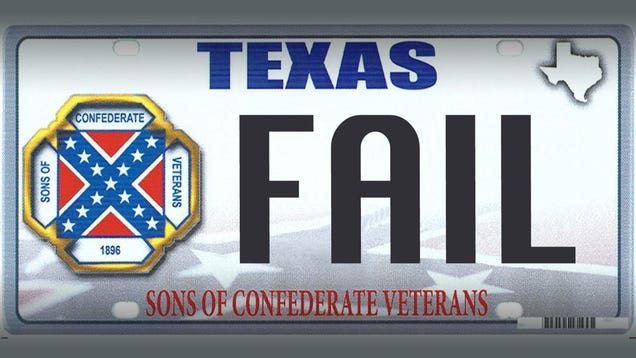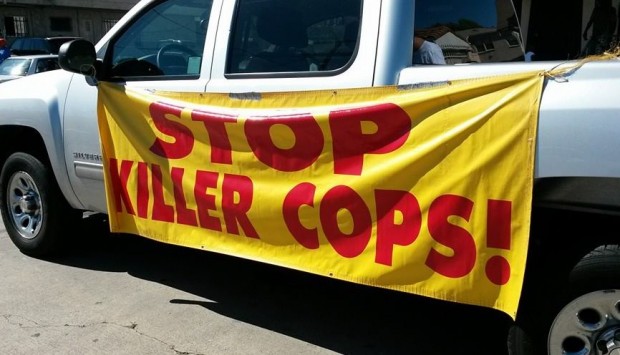 Even Clarence Thomas stood with the more liberal judges in saying the State of Texas can be forced into producing plates that send messages it doesn’t want to convey.
Even Clarence Thomas stood with the more liberal judges in saying the State of Texas can be forced into producing plates that send messages it doesn’t want to convey.
Washington Post
The Supreme Court ruled Thursday that messages displayed on specialized license plates are a form of government speech and Texas is free to reject a proposed design that features the Confederate flag.
Justice Clarence Thomas, the court’s only African American justice, split with fellow conservatives and joined the court’s liberals in the 5-to-4 decision. The majority held that the design proposed by the Sons of Confederate Veterans would not simply reflect the views of the motorist who purchased it, but implicate the state in speech it did not want to endorse.
Although the ruling concerned larger issues of free speech and government sensitivity, legal battles around the country over license plates have mostly been prompted by the display of the Confederate flag, seen as a symbol of heritage to some and an emblem of racism and oppression to others.
A Texas board rejected the design because it found “a significant portion of the public associate the confederate flag with organizations advocating expressions of hate directed toward people or groups.”
Justice Stephen G. Breyer, in announcing the decision, said the ruling produces a “kind of legal symmetry” to a previous ruling by the court that the state cannot compel a motorist to display a message he or she finds objectionable.
“Just as Texas cannot force a private citizen to convey on his or her licence plate a message with which he or she does not agree, so the Sons of Confederate Veterans cannot force Texas to convey on its license plate a message with which the state does not agree,” Breyer said from the bench.
Lower courts have split on the issue of whether license plate messages are private speech, protected by the First Amendment, or speech by the government, which is free to determine the content of what it says.
Because of a decision by the U.S. Court of Appeals for the 4th Circuit that the plates are private speech, Virginia and Maryland, for instance, are under court order to offer Sons of Confederate Veterans plates with the flag insignia.
The Supreme Court’s dissenters said Thursday’s decision “threatens private speech that government finds displeasing.”
“This capacious understanding of government speech takes a large and painful bite out of the First Amendment,” wrote Justice Samuel A. Alito Jr. “Specialty plates may seem innocuous. They make motorists happy, and they put money in a state’s coffers. But the precedent this case sets is dangerous.”
He was joined by Chief Justice John G. Roberts Jr. and Justices Antonin Scalia and Anthony M. Kennedy.
Joining Breyer and Thomas in the majority were Justices Ruth Bader Ginsburg, Sonia Sotomayor and Elena Kagan.
Texas, like many other states, has created a new revenue stream with the specialized plates, which are different from vanity plates that might have an individual’s name. In Texas, the legislature can propose a plate honoring a group or athletic team and offer those for sale.
The other way is for a group itself to propose the plate. The Texas commission first seemed to approve the SCV’s request, then rejected it after receiving tens of thousands of comments about the design, most of them negative. It was the first time the board had turned down a request.
As Alito noted, Texas offers more than 350 of the specialized plates with all sorts of messages, including “advertising Remax (Get It Sold with Remax”), Dr Pepper (“Always One of a Kind”), and Mighty Fine Burgers.”
A panel of the U.S. Court of Appeals for the 5th Circuit ruled for the Confederate organization. The judges split 2 to 1 that the license plates represented the speech of the motorist who bought and displayed them, not Texas.
Breyer said that was wrong.
A person could simply attach a bumper sticker with a preferred message in bigger type next to the license plate, Breyer wrote. “But the individual prefers a license plate design to the purely private speech expressed through bumper stickers. That may well be because Texas’s license plate designs convey government agreement with the message displayed,” he wrote.
Texas is not required to balance the messages it sends, Breyer said. “Texas offers plates that pay tribute to the Texas citrus industry. But it need not issue plates praising Florida’s oranges as far better,” Breyer wrote. “And Texas offers plates that say ‘Fight Terrorism.’ But it need not issue plates promoting al Qaeda.”
The majority relied on the court’s 2009 decision in Pleasant Grove City v. Summum, which said a city park with a Ten Commandments monument did not have to include a tribute to another religion. It said the city gets to decide which monuments to accept.
But Alito wrote the majority opinion in that case and said Breyer “badly misunderstands it.” A park has limited space, he said, while Texas has in effect created millions of moving billboards on which it has invited motorists to display their own messages.
Alito wrote that someone watching Texas vehicles pass by “might see plates bearing the name of a high school, a fraternity or sorority, the Masons, the Knights of Columbus, the Daughters of the American Revolution, a realty company, a favorite soft drink, a favorite burger restaurant, and a favorite NASCAR driver.”
He asked: “Would you really think that the sentiments reflected in these specialty plates are the views of the State of Texas and not those of the owners of the cars?”
He said Texas rejected the design only because it “concluded that many Texans would find the flag symbol offensive. That was pure viewpoint discrimination.”
It was hard not to speculate that Thomas, who normally sides with the conservatives in free speech cases, was swayed by the symbolism of the flag. He did not write to explain his view of the case. As the senior justice in the majority, he got to select who would write the opinion, and he chose Breyer.
The issue brought to mind Thomas’s role in a 2003 cross-burning case from Virginia. Justice Sandra Day O’Connor struck down the commonwealth’s law banning cross-burning as a violation of the First Amendment.
Thomas disagreed with the majority view that cross-burning might have some legitimate expressive value. “In our culture, cross-burning has almost invariably meant lawlessness and understandably instills in its victims well-grounded fear of physical violence,” he wrote.
The ruling on Thursday would seem to clear the way for states that had offered the SCV license plates only because of court order to stop the practice, but officials in Maryland and Virginia said it was too soon for such decisions.
“We’re reviewing the Supreme Court ruling,” said Brandy Brubaker, spokesman for the Virginia Department of Motor Vehicles. “By statute, license plates we issue are authorized by the General Assembly, so we would defer to the legislature for direction.”
Brubaker said that the General Assembly authorized a specialty license plate in 1999 to recognize Sons of Confederate Veterans. Legislators did not want the plate to bear an image of the Confederate flag, so the legislation stipulated that the plate would not incorporate any logo or emblem. The SCV sued and won. As of February of this year, the pla
tes had been issued for 1,343 passenger vehicles and 259 motorcycles.
Maryland officials were cautious as well about the next step. The agency has issued more than 400 SCV license plates since 1996, when the items first became available. Only 178 of those are still active, according to agency spokesman Buel Young.
The case is Walker v. Texas Division, Sons of Confederate Veterans.


More Stories
AT LEAST ONE OF THE COPS WHO KILLED EZELL FORD HAS STRUCK BEFORE
PEOPLES' MONDAY HONORS FALLEN VICTIMS IN NYC
PA STATE REP: 'A WHITE NATIONALIST…IS A LOT DIFFERENT THAN A WHITE SUPREMACIST'